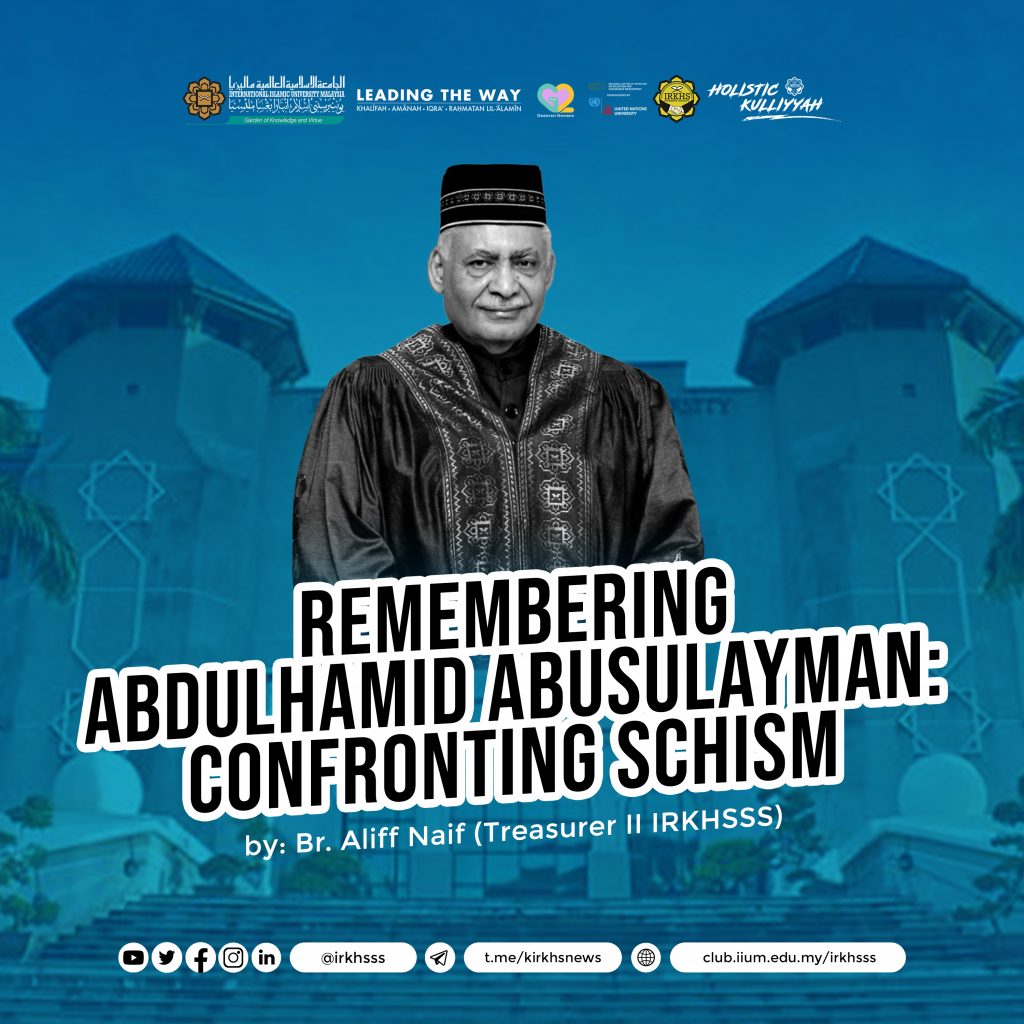Remembering AbdulHamid Abusulayman: Confronting Schism
- by izzataiman
- in Students' Works
- on November 7, 2021

“Revelation cannot function in the absence of a rational mind, and the rational mind is not worthy of recognition or respect if it strays from pure and simple revelation”
Almarhum Prof. Emeritus Dato’ Dr. AbdulHamid A. AbuSulayman, the 2nd Rector of IIUM
These words eloquently capture the vision and essence of AbdulHamid AbuSulayman’s life-long effort to integrate both revelation and reason. One concrete proof of this vision is the establishment of Kulliyyah of Islamic Revealed Knowledge and Human Sciences in IIUM. Prof. Kamal Hassan, the 3rd Rector of IIUM and AbdulHamid’s successor, once said in the Grand Intellectual Symposium organized by Islamic Revealed Knowledge and Human Sciences Students’ Society that, even though he was the Founding Dean of KIRKHS, but it was AbdulHamid who was the founder of the most iconic Kulliyyah in IIUM.
If AbdulHamid’s ideas are to be examined thoroughly, he was all against schism – of reason and revelation, of intellectualism and political leadership, and tribalism.
He was a man of knowledge, propagating the importance of it in every way. Even before he was brought to the International Islamic University of Malaysia (IIUM), he was already a great advocate of the importance of education and the Islamization of knowledge. After AbdulHamid departed from Malaysia after resigning as the Rector of IIUM, Anwar Ibrahim wrote a farewell letter from Sungai Buloh Prison. In the letter, Anwar mentioned how AbdulHamid was first invited to IIUM – although reluctant at first, AbdulHamid felt he was morally responsible to actualize all the ideas he was propagating.
In his writing Islamization: Reforming Contemporary Knowledge published in 1994 when AbdulHamid was still the Rector of IIUM, he discussed the decadence of the Ummah by questioning the crisis of knowledge that has befallen the Ummah. He noted that the dichotomy is being imposed by ourselves on the divine revelation and active reason. One can see how the Ummah is even divided this way where those who blindly follow the divine revelation without reason will resort to the uncomprehensive interpretation of our current problem, and those who only use reason without the proper guidance of the divine revelation will resort to the imitation of foreign ideas without understanding the different foundation of the Ummah. This refers back to the quote that has been written at the beginning of this essay.
One can say that the establishment of Kulliyyah of Islamic Revealed Knowledge and Human Sciences is the actualization of the solution that AbdulHamid wanted to be for the Ummah.
The other schism that AbdulHamid saw that brought the decadence of the Ummah is of the political leadership and intellectual leadership. We have seen in historical readings where the scholars have always been the opposition towards the political authorities. This clash of leadership had also emboldened the dichotomy of knowledge. The Ummah has seen that Islamic knowledge is only within the realm of intellectualism with no practical purposes. As AbdulHamid himself put it “Religious thought was confined to the level of abstraction and was not allowed to function in regulation practice and evaluating experience and experiment”
The political leadership also face a great conundrum when it was not guided in the spirit of Islam. “It initiated the evils of deceit, ignorance, and arrogance which crippled the structure of the Ummah”. AbdulHamid was trained in political science, hence his observation on the political problem of the Ummah bears great merit. He saw the problem of taking foreign ideas as our own, stripped of the divine foundation of the Ummah, and implemented blindly in terms of policies that have brought us to our decaying state. Eventually, we also faced such dichotomy in terms of knowledge.
The technical and unsystematic methods of thought that have dominated Islamic studies are due to the historical schism of political and intellectual leadership. AbdulHamid and the grand idea of KIRKHS are all about bridging such separation. For him, the schism brought deficiency to our thoughts, where we are unable to put the Islamic ideas into the context of the events of when it happened. There is the temporal requirement that we need to consider before blindly interpreting Islamic historical events, of which the failure to do so will only bring us to “theoretical thinking which the leadership cannot practically adopt or seriously consider”. The reaction that we give to certain issues needs to be put into the context of place and time if we want to attain a clear vision.
Our problem is in our approach and methods of thinking – our methodological deficiencies.
Another thing AbdulHamid is against is tribalism. The split of intellectual and political leadership also arises out of tribalism – when the tribal men infiltrated the early Ummah. Their ideas of brotherhood are narrower and of lower standard compared to the Companions. They cannot see past the limiting views they imposed on themselves. They also brought the problem that AbdulHamid termed as ‘Desert Culture’.
The idea of tribalism, taken from the nomadic tribe in the desert, has superseded the idea of Rahmatan Lil-Alamin, mercy to all mankind. This kind of idea is prevalent among the ruling elites which has indefinitely infiltrated itself into politics and governance. We have seen what had befallen us due to this narrow-minded view – internal wars and fighting among ourselves. The idea of Muslim brotherhood as binding elements of all of us is being eroded by tribalism. AbdulHamid is a man of a grand vision. He critically appraised the problem of the Ummah and brought solutions to it. IIUM and KIRKHS are the realizations of his idea. The schism and split of divine revelation and reason, of political and intellectual leadership, and tribalism are what AbdulHamid was trying to solve. As the IIUM community, as his students, as successors of such an idea, we have the moral responsibility to continue such a struggle until the Ummah understand thoroughly Rahmatan Lil-Alamin and shared it with the world. To commemorate eternally the realization of his idea, IIUM has decided to rename KIRKHS to AbdulHamid AbuSulayman Kulliyyah of Islamic Revealed Knowledge and Human Sciences (AHAS KIRKHS). May all the current and future generation of the Ummah remembers his great contribution to all of us. Al Fatihah.
This article is written by Br. Aliff Naif (Treasurer II IRKHSSS 2020/2021)
